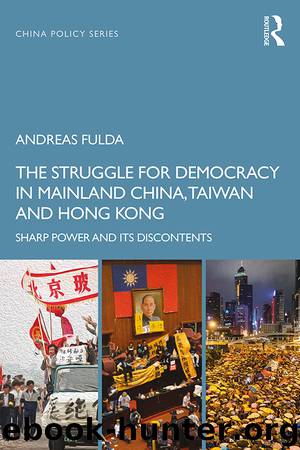The Struggle for Democracy in Mainland China, Taiwan and Hong Kong by Fulda Andreas;

Author:Fulda, Andreas;
Language: eng
Format: epub
Publisher: Routledge
Published: 2020-04-15T00:00:00+00:00
7
THE RISE AND DEMISE OF THE KMT PARTY-STATE IN TAIWAN
The Chinese Nationalist Party—or as it is better known under its transcribed Chinese name Kuomintang (KMT)—has for a long time been considered one of the world’s richest parties.1 Yet in November 2016 something remarkable happened: the KMT was unable to pay its staff and had to lay off more than half of its 738 employees.2 After winning both the presidency and gaining a majority in Taiwan’s parliament in January 2016, the Democratic Progressive Party (DPP) had
passed a law that assumes that all the KMT’s property is ill-gotten, bar membership fees, donations and the funding political parties receive from the government. The law allows the government to freeze the KMT’s assets while a committee assesses whether the party is the rightful owner, and to seize them if it judges otherwise. The KMT will only be able to reclaim assets it can prove it obtained legitimately.3
The DPP’s law stripping the KMT of its assets is significant, as it previously ruled the island-state for more than six decades: from 1945 until the narrow election victory of DPP president Chen Shui-bian in 2000, and then again during the KMT presidency of Ma Ying-jeou from 2008 until 2016.
The demise of the KMT’s party-state in 2016 also means that it took Taiwan’s democracy movement more than 100 years—beginning with the establishment of Taiwan’s first opposition organisation, the short-lived Assimilation Society (Dokakai) from 1914 to 1915, which lobbied for the rights of Taiwanese under Japanese rule4—to overcome authoritarianism by peaceful means. November 2016 marks a turning point in the island’s political history, since a financially broken KMT, which Cheng Tun-Jen in 2006 already described as “an anachronistic nation-building party and a catch-all party”,5 will not be able to re-emerge as an autocratic party-state in Taiwan’s future. The case of Taiwan shows that it is possible to defeat Leninist parties through social and political movements as well as through the ballot box.
Download
This site does not store any files on its server. We only index and link to content provided by other sites. Please contact the content providers to delete copyright contents if any and email us, we'll remove relevant links or contents immediately.
| Arms Control | Diplomacy |
| Security | Trades & Tariffs |
| Treaties | African |
| Asian | Australian & Oceanian |
| Canadian | Caribbean & Latin American |
| European | Middle Eastern |
| Russian & Former Soviet Union |
The Secret History by Donna Tartt(16618)
The Social Justice Warrior Handbook by Lisa De Pasquale(11489)
Thirteen Reasons Why by Jay Asher(7786)
This Is How You Lose Her by Junot Diaz(5767)
Weapons of Math Destruction by Cathy O'Neil(5034)
Zero to One by Peter Thiel(4823)
The Myth of the Strong Leader by Archie Brown(4789)
Promise Me, Dad by Joe Biden(4444)
Stone's Rules by Roger Stone(4415)
Beartown by Fredrik Backman(4412)
How Democracies Die by Steven Levitsky & Daniel Ziblatt(4396)
The Fire Next Time by James Baldwin(4341)
100 Deadly Skills by Clint Emerson(4075)
A Higher Loyalty: Truth, Lies, and Leadership by James Comey(4031)
Rise and Kill First by Ronen Bergman(4012)
The David Icke Guide to the Global Conspiracy (and how to end it) by David Icke(3880)
The Farm by Tom Rob Smith(3871)
Secrecy World by Jake Bernstein(3782)
The Doomsday Machine by Daniel Ellsberg(3730)
